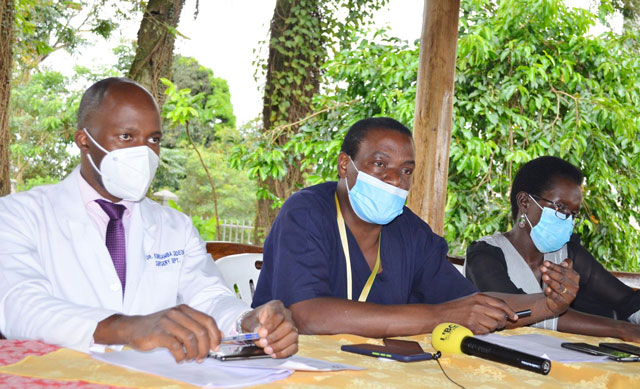
Kampala, Uganda | THE INDEPENDENT | A big percentage of people who end up presenting with cancer of the stomach and digestive system complications have been wrongly treated for ulcers, according to experts.
They revealed this while launching a medical camp scheduled to take place at Mulago Specialised National Referral hospital next week to create awareness about gastrointestinal illnesses.
Speaking at the launch, Dr. Josephant Jombwe, the head of the Gastrointestinal Unit at Mulago Specialised National Referral hospital, said that a lot of people with cancers show up late having treated ulcers unsuccessfully.
Increasingly, he says the patients turning up with very aggressive cancers are of young age.
Dr. Vivian Akello, the President of the Society of Uganda Gastrointestinal and Endoscopic Surgeons, an association that brings together Gastrointestinal experts say they have previously conducted a survey that showed that up to 50 % of the general population in some parts of Uganda has symptoms suggestive of peptic ulcers.
Gastrointestinal experts deal with diseases of the digestive system or the alimentary canal consisting of the food pipe, stomach, small and large intestines together with accessory organs like the liver and pancreas.
Jombwe says while they have had challenges previously of trained personnel to deal with such issues, recently the government trained super specialists in the area who will, in turn, be training others throughout the country. Mulago alone has 15 such specialists but Jombwe says they are hardly utilized as patients don’t show up.
The experts say out of Uganda’s population of about 45 million, they diagnose and treat at least 40,000 new cases of cancer each year and record at least 20,000 cancer-related deaths every year. Of the top 10 cancers in Uganda, four of them occur in the gastrointestinal or digestive system that is the liver, oesophagus, stomach and large intestines.
Jombwe says that self-medication and low healthcare-seeking behaviour are the leading cause of health problems that can’t be reversed or lead to huge expenditure on treatment. More disturbing he says that some of these diseases are related to preventable or treatable risk factors like hepatitis infection, tobacco smoking, excessive alcohol intake, poor diet and other modifiable lifestyle-related factors.
On any given day, Mulago hospital receives up to 10 patients requiring emergency specialized gastrointestinal surgical attention. Other regional referral hospitals and even private hospital also receive a similar number of patients on a nearly daily basis.
However, according to society, there is an estimated 50 functional endoscopic units in Uganda, the bulk of which are in Kampala and surrounding areas. Uganda has an estimated 400 surgeons representing an unacceptably low ratio of 1 surgeon per 100,000 people in the country.
Only 10 % of these surgeons have additional training in highly specialized gastrointestinal and endoscopic surgery. Overall, as part of the initiative to transform Mulago into a specialized referral facility, the government in 2017 trained 25 specialists in gastrointestinal and endoscopic surgery.
They have all returned to serve the country in both the public and private health sectors.
*******
URN
 The Independent Uganda: You get the Truth we Pay the Price
The Independent Uganda: You get the Truth we Pay the Price



